外研版八年级下册Module8 Time off同步复习学案(无答案)
文档属性
| 名称 | 外研版八年级下册Module8 Time off同步复习学案(无答案) |
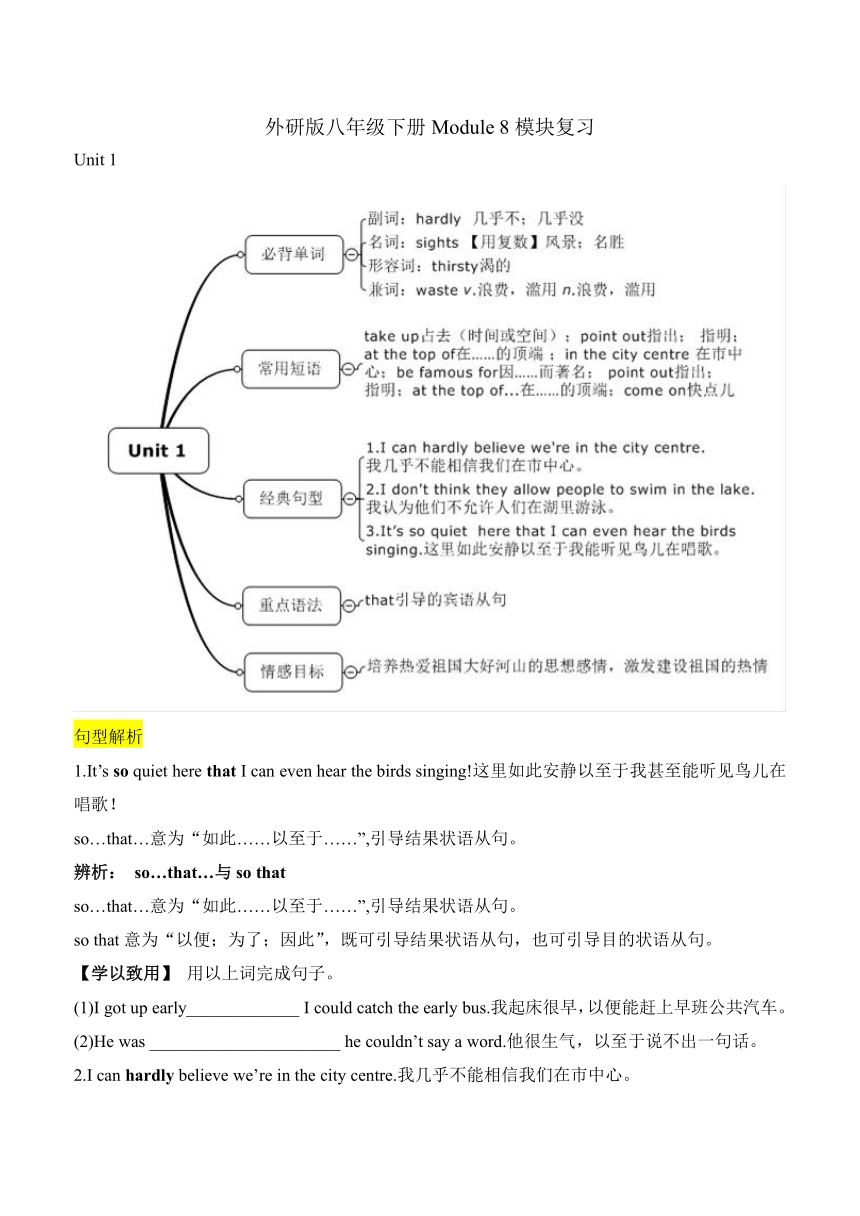
|
|
| 格式 | docx | ||
| 文件大小 | 224.7KB | ||
| 资源类型 | 教案 | ||
| 版本资源 | 外研版 | ||
| 科目 | 英语 | ||
| 更新时间 | 2024-04-24 22:31:19 | ||
图片预览

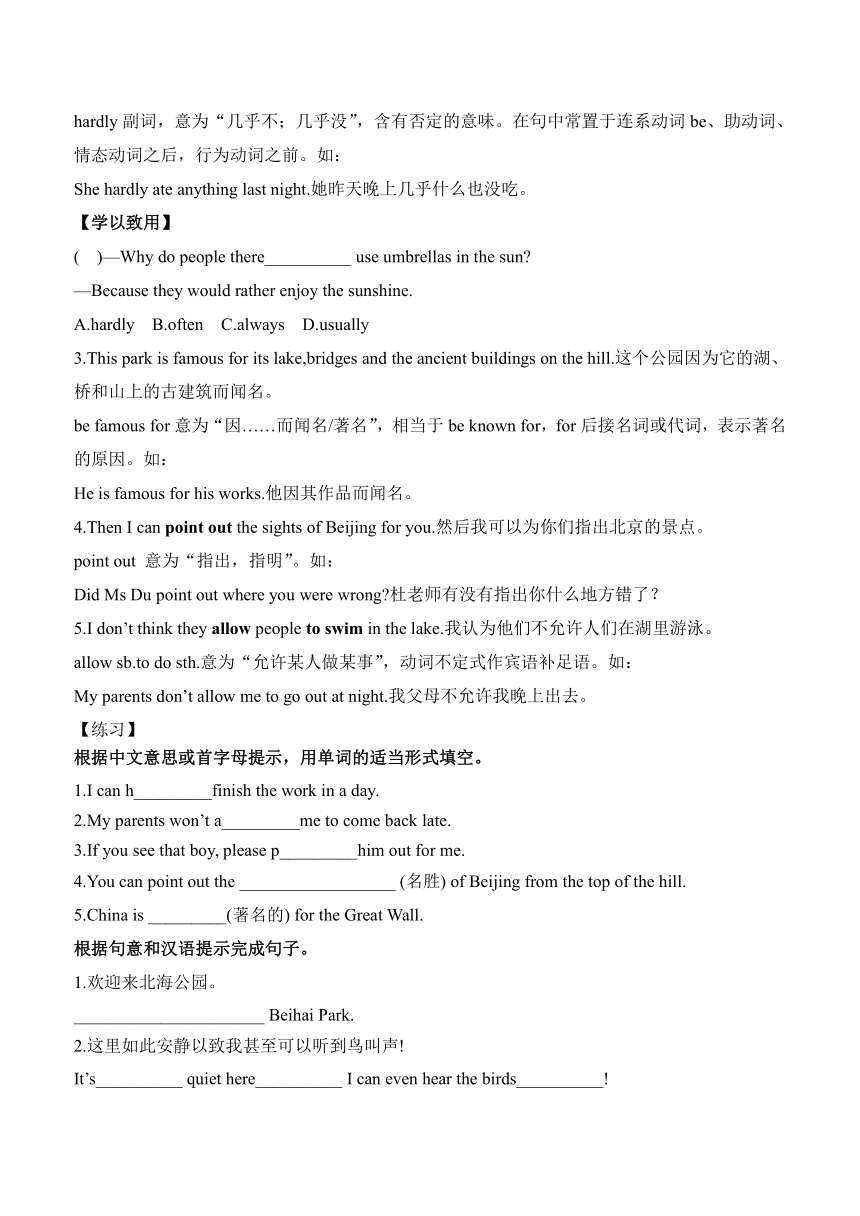
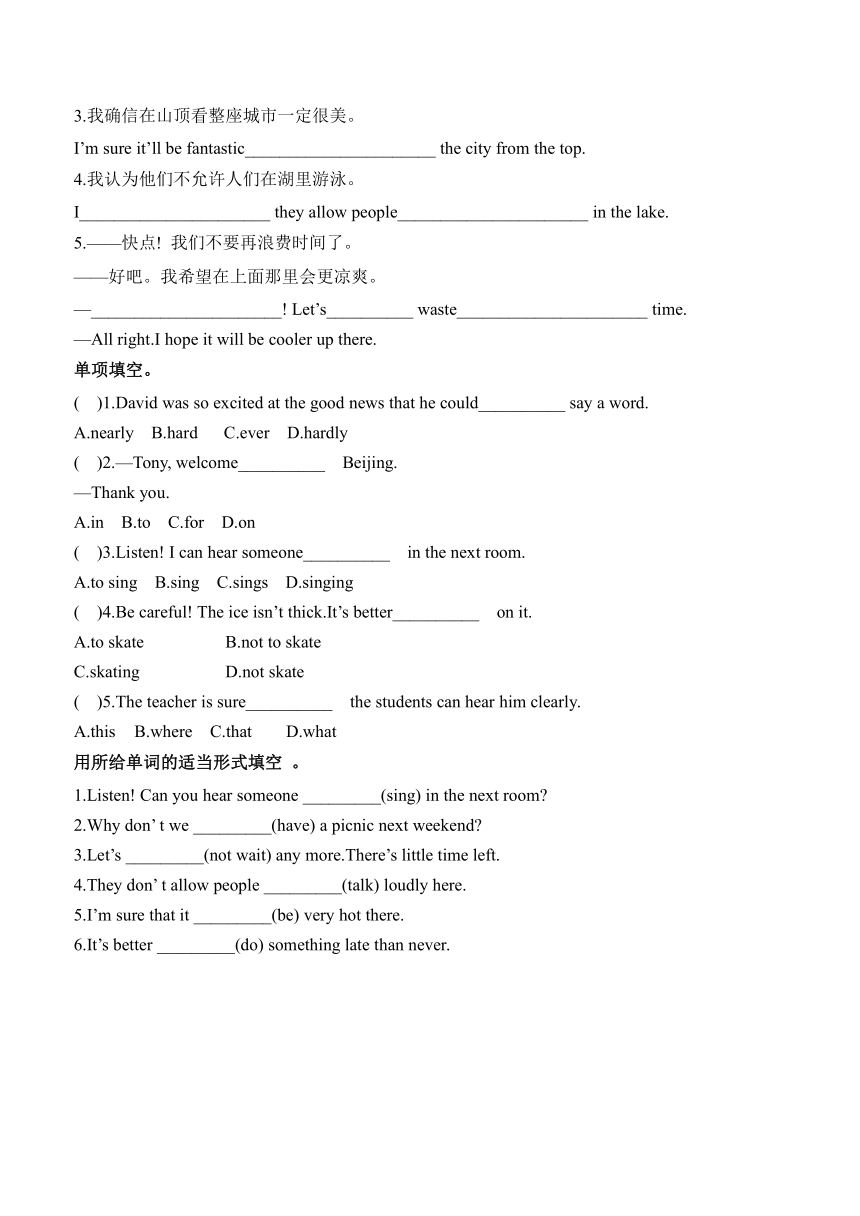
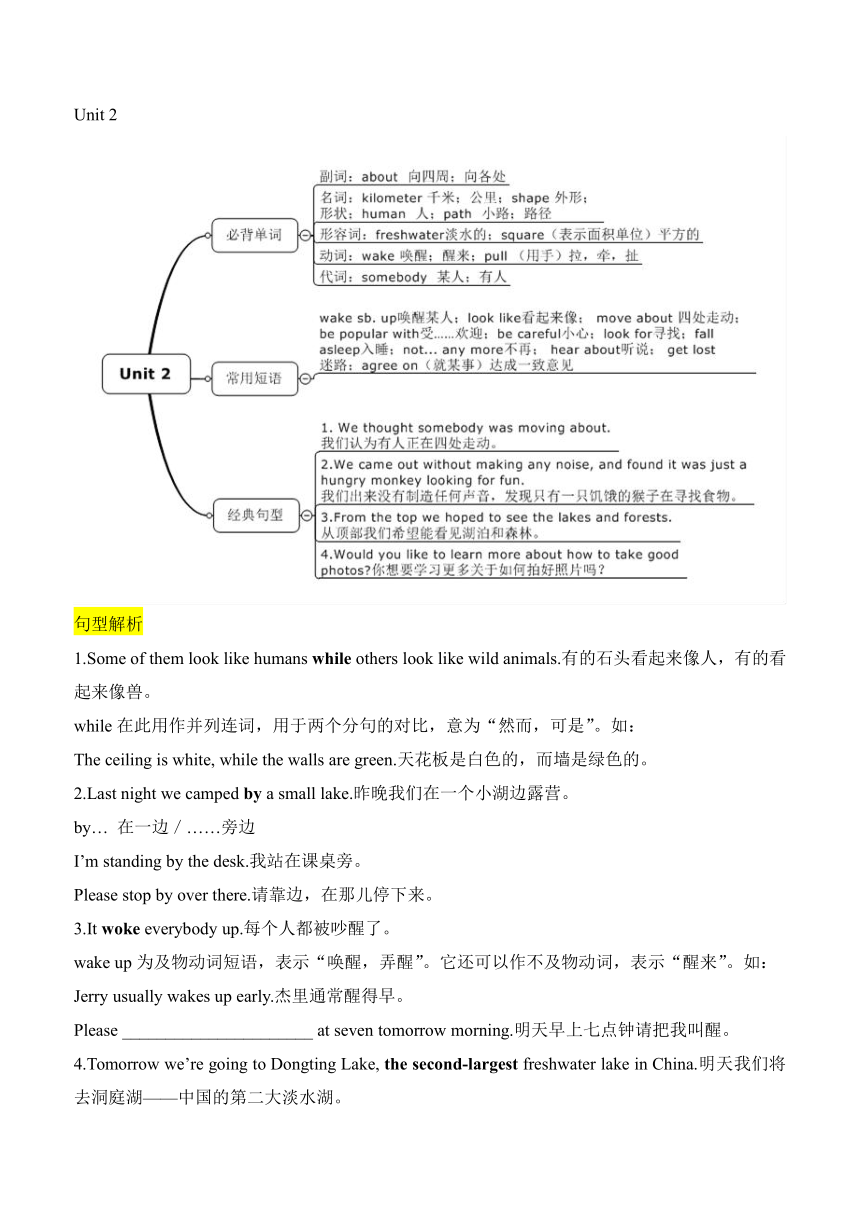
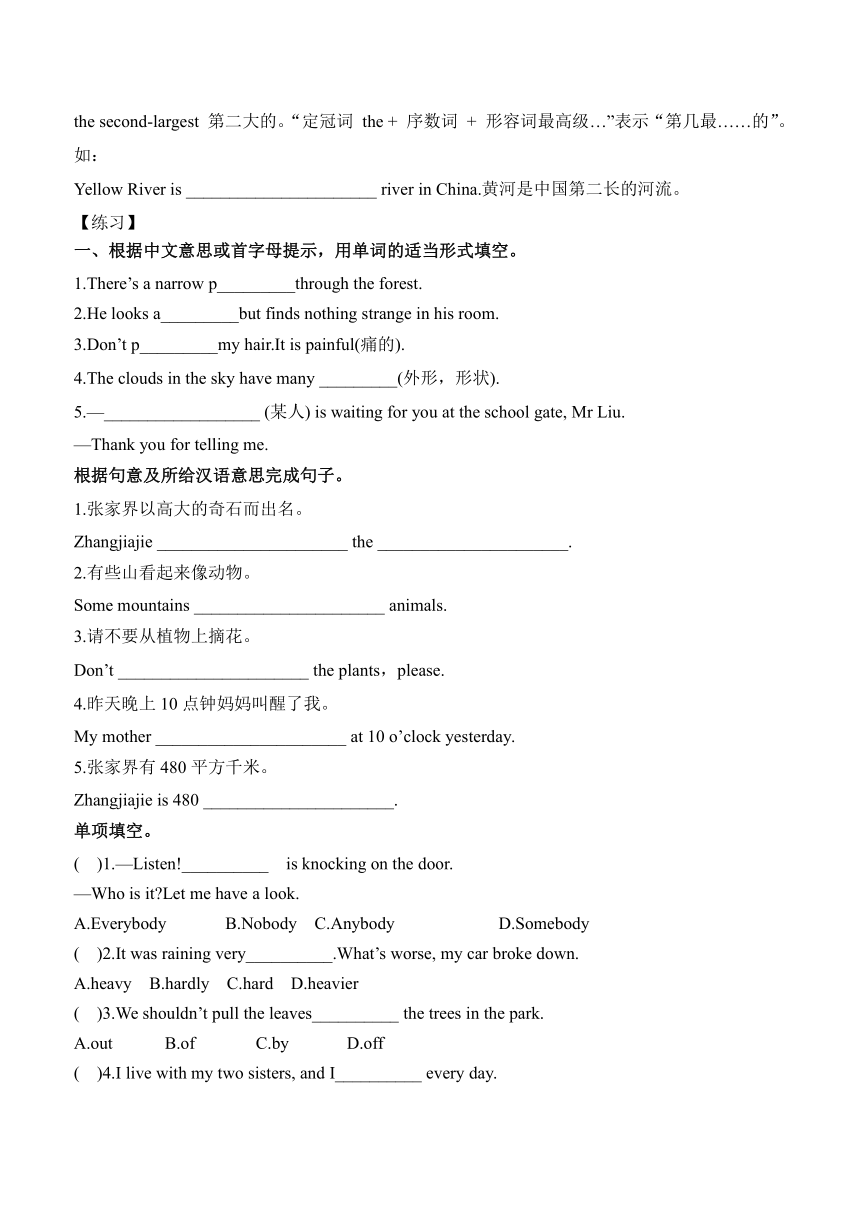
文档简介
外研版八年级下册Module 8模块复习
Unit 1
句型解析
1.It’s so quiet here that I can even hear the birds singing!这里如此安静以至于我甚至能听见鸟儿在唱歌!
so…that…意为“如此……以至于……”,引导结果状语从句。
辨析: so…that…与so that
so…that…意为“如此……以至于……”,引导结果状语从句。
so that意为“以便;为了;因此”,既可引导结果状语从句,也可引导目的状语从句。
【学以致用】 用以上词完成句子。
(1)I got up early_____________ I could catch the early bus.我起床很早,以便能赶上早班公共汽车。
(2)He was ______________________ he couldn’t say a word.他很生气,以至于说不出一句话。
2.I can hardly believe we’re in the city centre.我几乎不能相信我们在市中心。
hardly副词,意为“几乎不;几乎没”,含有否定的意味。在句中常置于连系动词be、助动词、情态动词之后,行为动词之前。如:
She hardly ate anything last night.她昨天晚上几乎什么也没吃。
【学以致用】
( )—Why do people there__________ use umbrellas in the sun
—Because they would rather enjoy the sunshine.
A.hardly B.often C.always D.usually
3.This park is famous for its lake,bridges and the ancient buildings on the hill.这个公园因为它的湖、桥和山上的古建筑而闻名。
be famous for意为“因……而闻名/著名”,相当于be known for,for后接名词或代词,表示著名的原因。如:
He is famous for his works.他因其作品而闻名。
4.Then I can point out the sights of Beijing for you.然后我可以为你们指出北京的景点。
point out 意为“指出,指明”。如:
Did Ms Du point out where you were wrong 杜老师有没有指出你什么地方错了?
5.I don’t think they allow people to swim in the lake.我认为他们不允许人们在湖里游泳。
allow sb.to do sth.意为“允许某人做某事”,动词不定式作宾语补足语。如:
My parents don’t allow me to go out at night.我父母不允许我晚上出去。
【练习】
根据中文意思或首字母提示,用单词的适当形式填空。
1.I can h_________finish the work in a day.
2.My parents won’t a_________me to come back late.
3.If you see that boy, please p_________him out for me.
4.You can point out the __________________ (名胜) of Beijing from the top of the hill.
5.China is _________(著名的) for the Great Wall.
根据句意和汉语提示完成句子。
1.欢迎来北海公园。
______________________ Beihai Park.
2.这里如此安静以致我甚至可以听到鸟叫声!
It’s__________ quiet here__________ I can even hear the birds__________!
3.我确信在山顶看整座城市一定很美。
I’m sure it’ll be fantastic______________________ the city from the top.
4.我认为他们不允许人们在湖里游泳。
I______________________ they allow people______________________ in the lake.
5.——快点! 我们不要再浪费时间了。
——好吧。我希望在上面那里会更凉爽。
—______________________! Let’s__________ waste______________________ time.
—All right.I hope it will be cooler up there.
单项填空。
( )1.David was so excited at the good news that he could__________ say a word.
A.nearly B.hard C.ever D.hardly
( )2.—Tony, welcome__________ Beijing.
—Thank you.
A.in B.to C.for D.on
( )3.Listen! I can hear someone__________ in the next room.
A.to sing B.sing C.sings D.singing
( )4.Be careful! The ice isn’t thick.It’s better__________ on it.
A.to skate B.not to skate
C.skating D.not skate
( )5.The teacher is sure__________ the students can hear him clearly.
A.this B.where C.that D.what
用所给单词的适当形式填空 。
1.Listen! Can you hear someone _________(sing) in the next room
2.Why don’ t we _________(have) a picnic next weekend
3.Let’s _________(not wait) any more.There’s little time left.
4.They don’ t allow people _________(talk) loudly here.
5.I’m sure that it _________(be) very hot there.
6.It’s better _________(do) something late than never.
Unit 2
句型解析
1.Some of them look like humans while others look like wild animals.有的石头看起来像人,有的看起来像兽。
while在此用作并列连词,用于两个分句的对比,意为“然而,可是”。如:
The ceiling is white, while the walls are green.天花板是白色的,而墙是绿色的。
2.Last night we camped by a small lake.昨晚我们在一个小湖边露营。
by… 在一边/……旁边
I’m standing by the desk.我站在课桌旁。
Please stop by over there.请靠边,在那儿停下来。
3.It woke everybody up.每个人都被吵醒了。
wake up为及物动词短语,表示“唤醒,弄醒”。它还可以作不及物动词,表示“醒来”。如:
Jerry usually wakes up early.杰里通常醒得早。
Please ______________________ at seven tomorrow morning.明天早上七点钟请把我叫醒。
4.Tomorrow we’re going to Dongting Lake, the second-largest freshwater lake in China.明天我们将去洞庭湖——中国的第二大淡水湖。
the second-largest 第二大的。“定冠词 the + 序数词 + 形容词最高级…”表示“第几最……的”。如:
Yellow River is ______________________ river in China.黄河是中国第二长的河流。
【练习】
一、根据中文意思或首字母提示,用单词的适当形式填空。
1.There’s a narrow p_________through the forest.
2.He looks a_________but finds nothing strange in his room.
3.Don’t p_________my hair.It is painful(痛的).
4.The clouds in the sky have many _________(外形,形状).
5.—__________________ (某人) is waiting for you at the school gate, Mr Liu.
—Thank you for telling me.
根据句意及所给汉语意思完成句子。
1.张家界以高大的奇石而出名。
Zhangjiajie ______________________ the ______________________.
2.有些山看起来像动物。
Some mountains ______________________ animals.
3.请不要从植物上摘花。
Don’t ______________________ the plants,please.
4.昨天晚上10点钟妈妈叫醒了我。
My mother ______________________ at 10 o’clock yesterday.
5.张家界有480平方千米。
Zhangjiajie is 480 ______________________.
单项填空。
( )1.—Listen!__________ is knocking on the door.
—Who is it Let me have a look.
A.Everybody B.Nobody C.Anybody D.Somebody
( )2.It was raining very__________.What’s worse, my car broke down.
A.heavy B.hardly C.hard D.heavier
( )3.We shouldn’t pull the leaves__________ the trees in the park.
A.out B.of C.by D.off
( )4.I live with my two sisters, and I__________ every day.
A.wake up them B.wake them up
C.wake up him D.wake him up
( )5.Jason likes the__________ of the cake.It is a heart.
A.color B.size C.smell D.shape
Unit 3
that引导的宾语从句
一、宾语从句
放在动词后面作宾语的句子,我们称为“宾语从句”。
二、宾语从句的分类
(1)that引导的宾语从句
(2)whether / if引导的宾语从句
(3)疑问词引导的宾语从句
本模块主要学习that引导的宾语从句
学习宾语从句要注意三个方面:引导词、语序和时态。
1. The Smiths have returned. Tony knows.
→Tony knows (that) the Smiths have returned.
2. We can get the best score in every match. Our coach hopes.
→Our coach hopes (that) we can get the best score in every match.
3. Peter will get on well with his classmates. Mother thinks.
→Mother thinks (that) Peter will get on well with his classmates.
4. Sally was having breakfast at 7:00 am yesterday. Tom said.
→Tom said (that) Sally was having breakfast at 7:00 am yesterday.
5. Susan visited the Great Wall. Betty believed.
→Betty believed (that) Susan visited the Great Wall.
6. The earth moves around the sun. The teacher said.
→The teacher said (that) the earth moves around the sun.
【结论】
1. 通过观察我们发现,用一个陈述句作宾语时,宾语从句用that引导;that只起连接作用,没有实际意义,也不在从句中充当任何成分,因此常省略。
2. 通过观察我们还发现,that引导的宾语从句都用________(陈述句/疑问句)语序。
3. 由例子1、2和3可知, 当主句的谓语动词是一般现在时的时候, that引导的宾语从句的谓语动词可根据需要使用适当的时态; 由例子4和5可知, 当主句的谓语动词是一般过去时的时候, that引导的宾语从句的谓语动词常用相应的_______(现在/过去)时态;
由例子6可知, 当that引导的宾语从句表述的是客观真理时, 不管主句的谓语动词是什么时态, 该从句的谓语动词必须用一般现在时。
三、需要注意的问题
并非所有的动词后面都可以接that引导的宾语从句,只有当谓语动词表示肯定概念时,如believe, expect, explain, feel, hear, hope, imagine, prefer,promise, report, say, see, tell, think,understand, warn, wish等其后面的句子一般由that引导。此时,that没有任何实际意义,目的是使读者清楚后面的句子是作前面动词的宾语,多数情况下可以 省略 。 如:
I hope (that) it will snow this winter.我希望这个冬天会下雪。
I believe (that) we shall become good friends.我相信我们能够成为好朋友。
Betty thinks (that) trees can improve the air.贝媞认为这是树木可以提高空气质量。
注意一: 并非所有的动词后面都可接that引导的宾语从句。常接that引导的宾语从句的谓语动词有:believe, expect, explain, feel, hear, hope, imagine, prefer, promise, report, say, see, tell, think, understand, warn, wish等。
注意二: think, believe, suppose等动词作主句的谓语,且主句的主语是第一人称时,宾语从句的否定,习惯上要转移到主句中,即“否定转移”。 如:
I don’t believe that he will do such a silly thing.我相信他不会做这样愚蠢的事情。
注意三: 有些宾语从句不能省略that。
(1)如果谓语动词后跟有两个或更多个并列的宾语从句,第二个及以后的that都不可以省略。如:
He said (that) the book was very interesting and that(不省略)all the children like to read it.他说这本书很有趣,很多孩子喜欢阅读这本书。
(2)主语中有it作形式宾语,that不可省。
I think it necessary that he should stay here.我认为他很有必要待在这里。
【练习】
Ⅰ. 根据汉语意思完成英语句子,每空词数不限。
1. 那时我觉得有东西在到处移动。
I thought ________________ at that time.
2. 我们猜测他昨天交了新朋友。
We guess ________________.
3. 大力的叔叔说巴黎是法国的首都。
Dali's uncle said ________________.
4. 大家都认为我们在这儿必须要小心。
Everyone thinks ________________.
5. 我们认为女孩晚上不能单独外出。
We don't think ________________.
Ⅱ. 根据材料内容,从方框中选择恰当的单词填空,使材料意思完整、通顺,有的需要变换形式,每词限用一次。
list, value, own, prefer, interest, crazy, just, coin, result, sunglasses
Hi, friends! I'm Lisa from America. Susan is my aunt. She (1)________ yard sales (庭院拍卖会). To be exact, I think Susan is (2)________ about yard sales. She doesn't want to miss any chance to buy good and (3)________ things. She appears almost in every yard sale. As a(n) (4)________, many people call her “Lady Yard-sale.” Susan doesn't take a(n) (5)________ in this name. She is (6)________ interested in yard sales.
One day, Susan came back from a yard sale. After taking off her (7)________, she entered her room. She was surprised to find that she had bought so many things. She counted them and made a(n) (8)________. “Oh, dear! I can't believe it. There are ten bikes, thirty fans, and five hundred (9)________ ... And they haven't been used even once.” She checked the numbers again. Then she thought, “I can hold my (10)________ yard sale to sell these things out.”
三、课后练习
阅读
There are many theaters in Beijing.If you want to know more information about them,you can visit our websites.
Huguang Guild Hall It has a big opera house.It is one of the four traditional theaters in Beijing.Most of the performances begin at 7:30 p.m. Price:70 yuan each person Tel:010-63518284 Web: www. Chang’an Grand Theater It was built in 1937.There are 800 comfortable seats in the theater. Tel:010-65101309 Web: www.
Lao She Teahouse It was built in 1988.Lao She Teahouse was named after the famous writer, Lao She.Visitors can enjoy the tea and Beijing-style(风格)snacks and watch traditional Chinese opera performances there. Price: 10—20 yuan for non-members (非会员) and 5 yuan for members Tel:010-63021717 Web: www. China Puppet Theater As a professional multi-functional(多功能的)theatre, China Puppet Theater has shadow plays(皮影) and puppet shows(木偶).Traditional stories make children of all ages enjoy themselves. Price: 50—100 yuan Tel:010-64254798 Web: www.
( )1.If you want to enjoy the Beijing-style snacks,you should go to__________ .
A.China Puppet Theater B.Huguang Guild Hall
C.Chang’an Grand Theater D.Lao She Teahouse
( )2.How much will Mr Chen pay for with his two children if he is a member of Lao She Teahouse
A.30 yuan. B.60 yuan. C.15 yuan. D.5 yuan.
( )3.What can’t we learn about Huguang Guild Hall from the passage
A.Its age. B.Its telephone number.
C.Its price. D.Its beginning time for the performances.
( )4.Where can we read this passage
A.In a storybook. B.On the Internet.
C.In a science magazine. D.In a novel.
( )5.Which of the following is TRUE
A.Chang’an Grand Theater is one of the four traditional theaters in Beijing.
B.Huguang Guild Hall can hold(容纳) 800 people at most.
C.Only young people can enjoy themselves in China Puppet Theater.
D.Lao She Teahouse was named after the famous writer, Lao She.
短文填空。
Whenever we see something new, we wish to write it down in one form or another. We will be happier if we share our experience 1._________others.Then 2._________can we write better travel stories The following may be helpful.
Memory and notes
You may have a good memory,3._________you cannot remember everything.
You are seeing and hearing so much information while you’re on a trip. When you return to write about your travel stories, you may forget something. So you should make notes, take photographs, and if 4.__________ , take videos. In this way, you can describe your travel and write it down 5._________missing anything.
Photographs and your stories
Photographs are very useful for you to remember 6._________you have seen.
As you see the photographs, you can describe your experiences easily by remembering how you felt when you took 7.__________ .
When you are writing about your travel stories, make sure they are not too short as your reader may not get the full impression(印象) of them and make sure they are not so 8._________that the reader may get bored.
Make sure your stories have popular factors and the reader will find your travel stories not only pleasant to 9.____________ , but useful as well. Popular factors are food to eat, places to stay and the things to look out for while 10.___________.They should also include what you’ve found useful and the things you miss so much.
Unit 1
句型解析
1.It’s so quiet here that I can even hear the birds singing!这里如此安静以至于我甚至能听见鸟儿在唱歌!
so…that…意为“如此……以至于……”,引导结果状语从句。
辨析: so…that…与so that
so…that…意为“如此……以至于……”,引导结果状语从句。
so that意为“以便;为了;因此”,既可引导结果状语从句,也可引导目的状语从句。
【学以致用】 用以上词完成句子。
(1)I got up early_____________ I could catch the early bus.我起床很早,以便能赶上早班公共汽车。
(2)He was ______________________ he couldn’t say a word.他很生气,以至于说不出一句话。
2.I can hardly believe we’re in the city centre.我几乎不能相信我们在市中心。
hardly副词,意为“几乎不;几乎没”,含有否定的意味。在句中常置于连系动词be、助动词、情态动词之后,行为动词之前。如:
She hardly ate anything last night.她昨天晚上几乎什么也没吃。
【学以致用】
( )—Why do people there__________ use umbrellas in the sun
—Because they would rather enjoy the sunshine.
A.hardly B.often C.always D.usually
3.This park is famous for its lake,bridges and the ancient buildings on the hill.这个公园因为它的湖、桥和山上的古建筑而闻名。
be famous for意为“因……而闻名/著名”,相当于be known for,for后接名词或代词,表示著名的原因。如:
He is famous for his works.他因其作品而闻名。
4.Then I can point out the sights of Beijing for you.然后我可以为你们指出北京的景点。
point out 意为“指出,指明”。如:
Did Ms Du point out where you were wrong 杜老师有没有指出你什么地方错了?
5.I don’t think they allow people to swim in the lake.我认为他们不允许人们在湖里游泳。
allow sb.to do sth.意为“允许某人做某事”,动词不定式作宾语补足语。如:
My parents don’t allow me to go out at night.我父母不允许我晚上出去。
【练习】
根据中文意思或首字母提示,用单词的适当形式填空。
1.I can h_________finish the work in a day.
2.My parents won’t a_________me to come back late.
3.If you see that boy, please p_________him out for me.
4.You can point out the __________________ (名胜) of Beijing from the top of the hill.
5.China is _________(著名的) for the Great Wall.
根据句意和汉语提示完成句子。
1.欢迎来北海公园。
______________________ Beihai Park.
2.这里如此安静以致我甚至可以听到鸟叫声!
It’s__________ quiet here__________ I can even hear the birds__________!
3.我确信在山顶看整座城市一定很美。
I’m sure it’ll be fantastic______________________ the city from the top.
4.我认为他们不允许人们在湖里游泳。
I______________________ they allow people______________________ in the lake.
5.——快点! 我们不要再浪费时间了。
——好吧。我希望在上面那里会更凉爽。
—______________________! Let’s__________ waste______________________ time.
—All right.I hope it will be cooler up there.
单项填空。
( )1.David was so excited at the good news that he could__________ say a word.
A.nearly B.hard C.ever D.hardly
( )2.—Tony, welcome__________ Beijing.
—Thank you.
A.in B.to C.for D.on
( )3.Listen! I can hear someone__________ in the next room.
A.to sing B.sing C.sings D.singing
( )4.Be careful! The ice isn’t thick.It’s better__________ on it.
A.to skate B.not to skate
C.skating D.not skate
( )5.The teacher is sure__________ the students can hear him clearly.
A.this B.where C.that D.what
用所给单词的适当形式填空 。
1.Listen! Can you hear someone _________(sing) in the next room
2.Why don’ t we _________(have) a picnic next weekend
3.Let’s _________(not wait) any more.There’s little time left.
4.They don’ t allow people _________(talk) loudly here.
5.I’m sure that it _________(be) very hot there.
6.It’s better _________(do) something late than never.
Unit 2
句型解析
1.Some of them look like humans while others look like wild animals.有的石头看起来像人,有的看起来像兽。
while在此用作并列连词,用于两个分句的对比,意为“然而,可是”。如:
The ceiling is white, while the walls are green.天花板是白色的,而墙是绿色的。
2.Last night we camped by a small lake.昨晚我们在一个小湖边露营。
by… 在一边/……旁边
I’m standing by the desk.我站在课桌旁。
Please stop by over there.请靠边,在那儿停下来。
3.It woke everybody up.每个人都被吵醒了。
wake up为及物动词短语,表示“唤醒,弄醒”。它还可以作不及物动词,表示“醒来”。如:
Jerry usually wakes up early.杰里通常醒得早。
Please ______________________ at seven tomorrow morning.明天早上七点钟请把我叫醒。
4.Tomorrow we’re going to Dongting Lake, the second-largest freshwater lake in China.明天我们将去洞庭湖——中国的第二大淡水湖。
the second-largest 第二大的。“定冠词 the + 序数词 + 形容词最高级…”表示“第几最……的”。如:
Yellow River is ______________________ river in China.黄河是中国第二长的河流。
【练习】
一、根据中文意思或首字母提示,用单词的适当形式填空。
1.There’s a narrow p_________through the forest.
2.He looks a_________but finds nothing strange in his room.
3.Don’t p_________my hair.It is painful(痛的).
4.The clouds in the sky have many _________(外形,形状).
5.—__________________ (某人) is waiting for you at the school gate, Mr Liu.
—Thank you for telling me.
根据句意及所给汉语意思完成句子。
1.张家界以高大的奇石而出名。
Zhangjiajie ______________________ the ______________________.
2.有些山看起来像动物。
Some mountains ______________________ animals.
3.请不要从植物上摘花。
Don’t ______________________ the plants,please.
4.昨天晚上10点钟妈妈叫醒了我。
My mother ______________________ at 10 o’clock yesterday.
5.张家界有480平方千米。
Zhangjiajie is 480 ______________________.
单项填空。
( )1.—Listen!__________ is knocking on the door.
—Who is it Let me have a look.
A.Everybody B.Nobody C.Anybody D.Somebody
( )2.It was raining very__________.What’s worse, my car broke down.
A.heavy B.hardly C.hard D.heavier
( )3.We shouldn’t pull the leaves__________ the trees in the park.
A.out B.of C.by D.off
( )4.I live with my two sisters, and I__________ every day.
A.wake up them B.wake them up
C.wake up him D.wake him up
( )5.Jason likes the__________ of the cake.It is a heart.
A.color B.size C.smell D.shape
Unit 3
that引导的宾语从句
一、宾语从句
放在动词后面作宾语的句子,我们称为“宾语从句”。
二、宾语从句的分类
(1)that引导的宾语从句
(2)whether / if引导的宾语从句
(3)疑问词引导的宾语从句
本模块主要学习that引导的宾语从句
学习宾语从句要注意三个方面:引导词、语序和时态。
1. The Smiths have returned. Tony knows.
→Tony knows (that) the Smiths have returned.
2. We can get the best score in every match. Our coach hopes.
→Our coach hopes (that) we can get the best score in every match.
3. Peter will get on well with his classmates. Mother thinks.
→Mother thinks (that) Peter will get on well with his classmates.
4. Sally was having breakfast at 7:00 am yesterday. Tom said.
→Tom said (that) Sally was having breakfast at 7:00 am yesterday.
5. Susan visited the Great Wall. Betty believed.
→Betty believed (that) Susan visited the Great Wall.
6. The earth moves around the sun. The teacher said.
→The teacher said (that) the earth moves around the sun.
【结论】
1. 通过观察我们发现,用一个陈述句作宾语时,宾语从句用that引导;that只起连接作用,没有实际意义,也不在从句中充当任何成分,因此常省略。
2. 通过观察我们还发现,that引导的宾语从句都用________(陈述句/疑问句)语序。
3. 由例子1、2和3可知, 当主句的谓语动词是一般现在时的时候, that引导的宾语从句的谓语动词可根据需要使用适当的时态; 由例子4和5可知, 当主句的谓语动词是一般过去时的时候, that引导的宾语从句的谓语动词常用相应的_______(现在/过去)时态;
由例子6可知, 当that引导的宾语从句表述的是客观真理时, 不管主句的谓语动词是什么时态, 该从句的谓语动词必须用一般现在时。
三、需要注意的问题
并非所有的动词后面都可以接that引导的宾语从句,只有当谓语动词表示肯定概念时,如believe, expect, explain, feel, hear, hope, imagine, prefer,promise, report, say, see, tell, think,understand, warn, wish等其后面的句子一般由that引导。此时,that没有任何实际意义,目的是使读者清楚后面的句子是作前面动词的宾语,多数情况下可以 省略 。 如:
I hope (that) it will snow this winter.我希望这个冬天会下雪。
I believe (that) we shall become good friends.我相信我们能够成为好朋友。
Betty thinks (that) trees can improve the air.贝媞认为这是树木可以提高空气质量。
注意一: 并非所有的动词后面都可接that引导的宾语从句。常接that引导的宾语从句的谓语动词有:believe, expect, explain, feel, hear, hope, imagine, prefer, promise, report, say, see, tell, think, understand, warn, wish等。
注意二: think, believe, suppose等动词作主句的谓语,且主句的主语是第一人称时,宾语从句的否定,习惯上要转移到主句中,即“否定转移”。 如:
I don’t believe that he will do such a silly thing.我相信他不会做这样愚蠢的事情。
注意三: 有些宾语从句不能省略that。
(1)如果谓语动词后跟有两个或更多个并列的宾语从句,第二个及以后的that都不可以省略。如:
He said (that) the book was very interesting and that(不省略)all the children like to read it.他说这本书很有趣,很多孩子喜欢阅读这本书。
(2)主语中有it作形式宾语,that不可省。
I think it necessary that he should stay here.我认为他很有必要待在这里。
【练习】
Ⅰ. 根据汉语意思完成英语句子,每空词数不限。
1. 那时我觉得有东西在到处移动。
I thought ________________ at that time.
2. 我们猜测他昨天交了新朋友。
We guess ________________.
3. 大力的叔叔说巴黎是法国的首都。
Dali's uncle said ________________.
4. 大家都认为我们在这儿必须要小心。
Everyone thinks ________________.
5. 我们认为女孩晚上不能单独外出。
We don't think ________________.
Ⅱ. 根据材料内容,从方框中选择恰当的单词填空,使材料意思完整、通顺,有的需要变换形式,每词限用一次。
list, value, own, prefer, interest, crazy, just, coin, result, sunglasses
Hi, friends! I'm Lisa from America. Susan is my aunt. She (1)________ yard sales (庭院拍卖会). To be exact, I think Susan is (2)________ about yard sales. She doesn't want to miss any chance to buy good and (3)________ things. She appears almost in every yard sale. As a(n) (4)________, many people call her “Lady Yard-sale.” Susan doesn't take a(n) (5)________ in this name. She is (6)________ interested in yard sales.
One day, Susan came back from a yard sale. After taking off her (7)________, she entered her room. She was surprised to find that she had bought so many things. She counted them and made a(n) (8)________. “Oh, dear! I can't believe it. There are ten bikes, thirty fans, and five hundred (9)________ ... And they haven't been used even once.” She checked the numbers again. Then she thought, “I can hold my (10)________ yard sale to sell these things out.”
三、课后练习
阅读
There are many theaters in Beijing.If you want to know more information about them,you can visit our websites.
Huguang Guild Hall It has a big opera house.It is one of the four traditional theaters in Beijing.Most of the performances begin at 7:30 p.m. Price:70 yuan each person Tel:010-63518284 Web: www. Chang’an Grand Theater It was built in 1937.There are 800 comfortable seats in the theater. Tel:010-65101309 Web: www.
Lao She Teahouse It was built in 1988.Lao She Teahouse was named after the famous writer, Lao She.Visitors can enjoy the tea and Beijing-style(风格)snacks and watch traditional Chinese opera performances there. Price: 10—20 yuan for non-members (非会员) and 5 yuan for members Tel:010-63021717 Web: www. China Puppet Theater As a professional multi-functional(多功能的)theatre, China Puppet Theater has shadow plays(皮影) and puppet shows(木偶).Traditional stories make children of all ages enjoy themselves. Price: 50—100 yuan Tel:010-64254798 Web: www.
( )1.If you want to enjoy the Beijing-style snacks,you should go to__________ .
A.China Puppet Theater B.Huguang Guild Hall
C.Chang’an Grand Theater D.Lao She Teahouse
( )2.How much will Mr Chen pay for with his two children if he is a member of Lao She Teahouse
A.30 yuan. B.60 yuan. C.15 yuan. D.5 yuan.
( )3.What can’t we learn about Huguang Guild Hall from the passage
A.Its age. B.Its telephone number.
C.Its price. D.Its beginning time for the performances.
( )4.Where can we read this passage
A.In a storybook. B.On the Internet.
C.In a science magazine. D.In a novel.
( )5.Which of the following is TRUE
A.Chang’an Grand Theater is one of the four traditional theaters in Beijing.
B.Huguang Guild Hall can hold(容纳) 800 people at most.
C.Only young people can enjoy themselves in China Puppet Theater.
D.Lao She Teahouse was named after the famous writer, Lao She.
短文填空。
Whenever we see something new, we wish to write it down in one form or another. We will be happier if we share our experience 1._________others.Then 2._________can we write better travel stories The following may be helpful.
Memory and notes
You may have a good memory,3._________you cannot remember everything.
You are seeing and hearing so much information while you’re on a trip. When you return to write about your travel stories, you may forget something. So you should make notes, take photographs, and if 4.__________ , take videos. In this way, you can describe your travel and write it down 5._________missing anything.
Photographs and your stories
Photographs are very useful for you to remember 6._________you have seen.
As you see the photographs, you can describe your experiences easily by remembering how you felt when you took 7.__________ .
When you are writing about your travel stories, make sure they are not too short as your reader may not get the full impression(印象) of them and make sure they are not so 8._________that the reader may get bored.
Make sure your stories have popular factors and the reader will find your travel stories not only pleasant to 9.____________ , but useful as well. Popular factors are food to eat, places to stay and the things to look out for while 10.___________.They should also include what you’ve found useful and the things you miss so much.
同课章节目录
- Module 1 Feelings and impressions
- Unit 1 It smells delicious.
- Unit 2 I feel nervous when I speak Chinese .
- Unit 3 Language in use
- Module 2 Experiences
- Unit 1 I've also entered lots of speaking competi
- Unit 2 They have seen the Pyramids.
- Unit 3 Language in use
- Module 3 Journey to space
- Unit 1 Has it arrived yet?
- Unit 2 We have not found life on any other planet
- Unit 3 Language in use
- Module 4 Seeing the docto
- Unit 1 I haven't done much exercise since I got m
- Unit 2 We have played football for a year now
- Unit 3 Language in use
- Module 5 Cartoons
- Unit 1 It's time to watch a cartoon.
- Unit 2 Tintin has been popular for over eighty yea
- Unit 3 Language in use
- Revision module A
- Module 6 Hobbies
- Unit 1 Do you collect anything ?
- Unit 2 Hobbies can make you grow as a person.
- Unit 3 Language in use
- Module 7 Summer in Los Angeles
- Unit 1 Please write to me and send me some photos
- Unit 2 Fill out a form and come to learn English
- Unit 3 Language in use
- Module 8 Time off
- Unit 1 I can hardly believe we are in the city ce
- Unit 2 We thought somebody was moving about
- Unit 3 Language in use
- Module 9 Friendship
- Unit 1 Could I ask if you've mentioned this to he
- Unit 2 I believe that the world is what you think
- Unit 3 Language in use
- Module 10 On the radio
- Unit 1 I hope that you can join us one day
- Unit 2 It seemed that they were speaking to me in
- Unit 3 Language in use
- Revision module B
